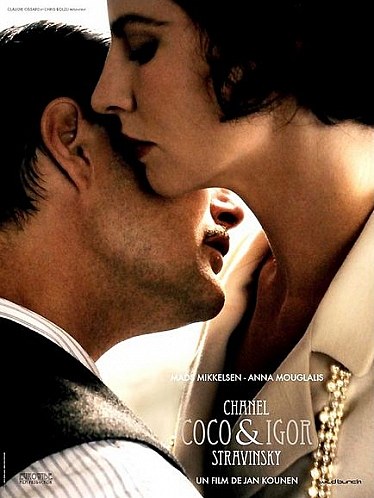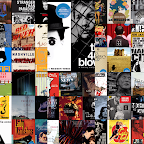7/23/2010
Movie Review: Coco Chanel & Igor Stravinsky (2010)
AKA: Coco Chanel and Igor Stravinsky; Coco and Igor
There is a scene near the end of Jan Kounen's Coco Chanel & Igor Stravinsky wherein for no apparent reason we see the two figures separately-- presumably shortly before succumbing to death from old age -- before again the editor moves us back into the narrative for a wrap-up.
The intent is most likely to illustrate that long after their love affair ended, Coco Chanel and Igor Stravinsky were still on each other's minds or that somehow their time together was so significant that it was one of the things they ruminated on during the twilight of their lives but the problem is, nothing in the movie that had preceded this clip manages to support the emotional impact that the director was hoping to convey.
Basically, we're introduced to two artistic geniuses in their respective fields of fashion design and musical composition whose lives run parallel for awhile before intersecting. And while the fruits of their passion culminated or more likely just happened to chronologically coincide with Chanel's creation of the perfume Chanel No. 5 and the revival of Stravinsky's controversial “Rite of Spring,” we don't really get the sense that these professional accomplishments wouldn't have happened without their sizzling extramarital affair.
Would a chemist still have managed to craft the winning combination of a perfume that contains the essence of a woman and feels more like a ribbon of scent rather than a cloud if Coco Chanel had not been sleeping with Stravinsky?
Likewise, of course Coco Chanel's financial contribution to serve as a patron (without Stravinsky's knowledge) and her arrangement to let the penniless Russian composer, his sick wife and young children move out of a hotel and into her villa no doubt assisted in Stravinsky's ability to work and flourish.
However, other than simply wanting to seduce the man as a sort of high class groupie, we're not quite sure that there was anything artistically liberating about their relationship aside from the conveniences of comfort and pocket change, which basically makes the pretentious posturing that their affair was somehow a divine meeting of the minds seem a bit foolish.
Ultimately, Kounen's film works as a titillating work of gossip in relishing in the type of salacious situations we see in supermarket magazines whilst masquerading as a presumptuous biopic. Needless to say, it's absolutely luscious to look at with a simply masterful opening sequence. Kounen ambitiously recreates the disastrous debut of Stravinsky's “The Rite of Spring” in 1914 to a near riotous crowd that required police presence. The director films "The Rite" in a way that – combined with all of the biographical information supplied by Sony Pictures Classics in the press kit – made me wonder if perhaps the film would have been far more fascinating if it dealt solely with the life, work, triumphs and failures of Igor Stravinsky.
While the cast is uniformly excellent, it's Mads Mikkelsen's transformative turn as Stravinsky that we easily find the most compelling throughout, which no doubt was affected by the fact that in an entirely different but recent production distributed by the same studio, we were already treated to a far superior handling of the life of the designer with Anne Fontaine's Coco Before Chanel.
Obviously, this should not imply that actress Anna Mouglalis is at fault as she makes a terrific Chanel but unfortunately, the seamstress turned shopkeeper turned style diva mostly infuriates us, the more we learn about her as she toys with peoples' lives at her whim and proves that in addition to being an expert at making a dress, she can just as easily and with no guilt whatsoever destroy a home.
And while Mikkelsen is a marvel throughout, struggling to balance his relationship with Chanel with his duties and love for his family in a way that convinces us he's thinking in character to the point where we wonder what else he could've done with the part if it were bigger, as far as this particular film goes, the biggest, unexpected revelation is in the portrayal of Stravinsky's wife Katarina played with staggering directness and subtlety by Elena Morozova.
Traditionally, playing the sexless role of the wife who's been cheated on is a rather thankless task in cinema, especially when your character is given the added sympathetic and downright pathetic crutch of being unable to really defend oneself since she's mostly bedridden throughout due to tuberculosis.
But Morozova not only has the best dialogue in terms of warning her husband that Chanel simply collects people and understands nothing about music or composition all the while telling the other woman not to distract him so much that it takes him from his work but she's also the most easily relatable character in the entire film.
Devoted to her husband as an important collaborator as well as a wife as his best or “most honest” critic who corrects and recopies his sheet music from bed, Morozova's Katarina may be devastated by the infidelity as right from the start she knows what's going on when the music stops below her after Coco's shoes have stepped into the study but she's also dignified in the way she loves her husband on a level that's beyond Coco's depth of understanding and seems to understand the two far better than they do given the fact that she has the outsider's point-of-view.
Yet unfortunately, the film spends too little time with Katarina or authentic emotion and character discovery and way too much screen time on the wretched affair of two equally strong willed, self-absorbed creatures who gravitate towards one another with a magnetically scientific force rather than with an entirely romantic one we can therefore feel invested in or empathize with on an intimate level.
And in the end, it's all so cold and calculated that you're unable to think anything other than "Coco Chanel and Igor Stravinsky hooked up" and there's nothing unique or terribly interesting about that, no matter what a forced edit tries to infer about it by jumping decades into the future in a sequence that hits all the wrong notes with absolutely no style.
Text ©2010, Film Intuition, LLC; All Rights Reserved. http://www.filmintuition.com Unauthorized Reproduction or Publication Elsewhere is Strictly Prohibited and in violation of the Digital Millennium Copyright Act.
FTC Disclosure: Per standard professional practice, I attended a free press screening of this title in order to evaluate it for my readers, which had no impact whatsoever on whether or not it received a favorable or unfavorable critique.





















